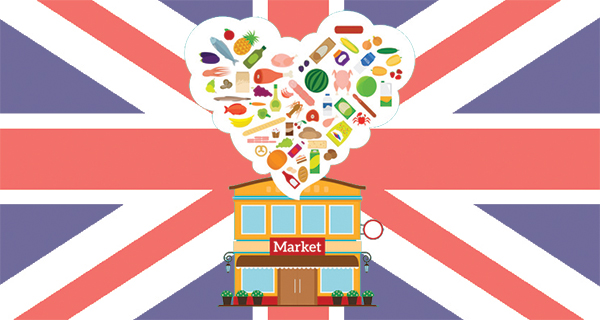
By Megan Saunders
Brits might be famous for fry-ups and Sunday Roasts but they’re becoming increasingly worried about what this poor diet means for their health. Nearly half of British adults (47%) say they’ve become more health conscious in the past 12 months, according to marketers Newscred while 49% admit to checking health articles a few times a week. And crucially for food and drink brands 65% say it’s about times brands offered better health content on packs.

UK IN THE TOP 5 FATTEST COUNTRIES – It takes only a passing glance at recent obesity figures to explain the shift in attitudes. Nearly two thirds of men and women in the UK are obese, according to research from the University of Washington, placing it in the top five fattest countries in the world. Concerns at the impact this weight gain is having on the nation’s health has fuelled the popularity of online food bloggers such as Ella Woodward and Madeleine Shaw promoting a diet of ‘clean eating’ and an aversion to all processed foods, including gluten and dairy. “There is more information in the media on healthy eating and on unhealthy options,” agrees Rick Hay, food and fitness nutritionist. “There are also lots more TV shows on ageing and health and lots of information daily on social media.”
THE TIMES THEY ARE A’CHANGING – To some extent the new British preoccupation with health is pushing food and drink brands to make a change. In March this year chancellor George Osborne unveiled a controversial new sugar tax requiring soft drinks companies to pay a levy on drinks with added sugar from April 2018 with the proceeds used to double sports funding for primary schools. The levy is expected to cost food and drinks brands more than £500m, with brands such as Coca Cola highly critical of the government’s plan. The tax will force brands to rethink recipes or be penalised, with Coca Cola alone investing £15m in reformulation projects to reduce sugar and calories and minimise impact. Italian soft drinks brand San Pellegrino (which contains 1.5 g more sugar per 100g than Coca Cola) will also be affected.
 LET’S TAKE THE “HEALTHY FOOD” CHANCHE – But if this clampdown is bad news for unhealthy brands, it also creates huge opportunities for naturally healthy produce, and brands that market their healthy credentials successfully. According to data published by market research group Kantar, grocery sales rose 0.2% year on year in the 12 weeks to 31 January, driven by a 5% gain in the sale of both fruit and vegetables as customers looked to start 2016 on a healthy note. Retailers are responding to the trend too. In April Asda relaunched its own healthy eating plan for shoppers, Tesco now offers free fruit for kids and many have ditched so-called ‘guilty lanes,’ areas near tills previously packed full of sweets and chocolate bars to tempt customers. British shoppers also say they’re relying on brands to help them become healthier, with one third (29%) adding that they think more highly of brands that are transparent about their health content. “As such products which place a strong emphasis on their nutritional excellence are likely to chime among consumers,” according to Emma Clifford, senior food analyst at Mintel. “Drawing attention to the specific benefits can create more tangibility.”
LET’S TAKE THE “HEALTHY FOOD” CHANCHE – But if this clampdown is bad news for unhealthy brands, it also creates huge opportunities for naturally healthy produce, and brands that market their healthy credentials successfully. According to data published by market research group Kantar, grocery sales rose 0.2% year on year in the 12 weeks to 31 January, driven by a 5% gain in the sale of both fruit and vegetables as customers looked to start 2016 on a healthy note. Retailers are responding to the trend too. In April Asda relaunched its own healthy eating plan for shoppers, Tesco now offers free fruit for kids and many have ditched so-called ‘guilty lanes,’ areas near tills previously packed full of sweets and chocolate bars to tempt customers. British shoppers also say they’re relying on brands to help them become healthier, with one third (29%) adding that they think more highly of brands that are transparent about their health content. “As such products which place a strong emphasis on their nutritional excellence are likely to chime among consumers,” according to Emma Clifford, senior food analyst at Mintel. “Drawing attention to the specific benefits can create more tangibility.”
THE ITALIAN JOB – And Italian brands have an advantage. The ‘Mediterranean diet’ has been at the forefront of the media in recent years due to its appealing balance of delicious food and enormous health benefits. Alice Fotheringham, head of Nutrition & Product Development at baby food brand Piccolo agrees. “The Mediterranean approach to nutrition and lifestyle is one that champions fresh ingredients, lovingly prepared, shared with friends and family,” she says. “It promotes the idea that life is better when there is a balance in areas such as nutrition, flavour, work and family.” Both organic and 100% natural Piccolo’s own range of six fruit and vegetable purées highlight these Italian roots to ensure customers view the brand as “good, honest and natural food,” that fits in with their healthy agenda. And there’s no reason why many more Italian brands can’t do the same and make the most of the new health conscious Brit.
